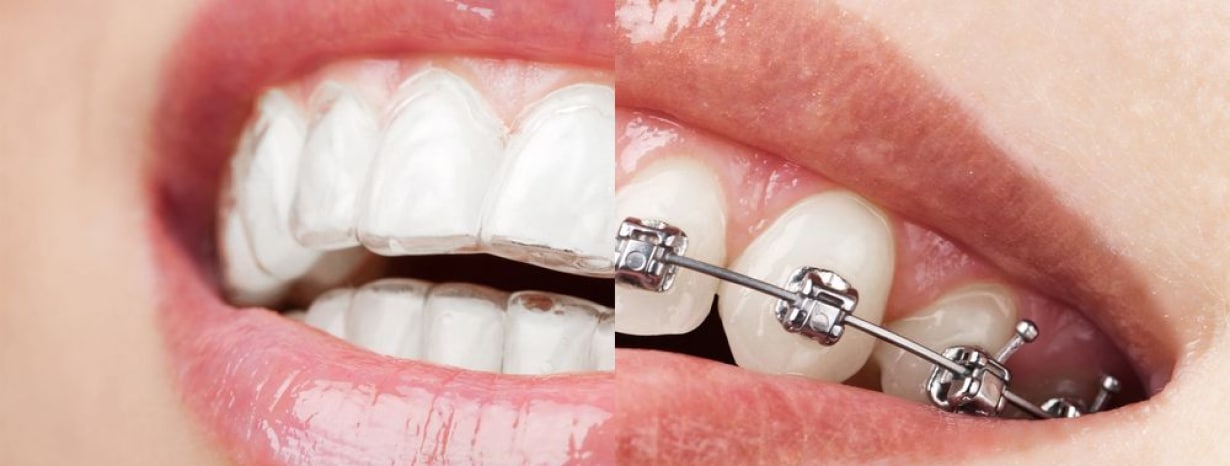Fill out this short Smile Assessment to discover which teeth straightening option is best for you and get a custom consultation!
One of the primary reasons patients choose Invisalign over traditional braces is because treatment is discreet and virtually invisible. However, as with any dental care, it is important to discuss the pros and cons of Invisalign treatment with a certified Invisalign provider such as Dr. Carmen Every-Degel during your initial consultation.
The only way to determine whether Invisalign is the right choice for you is to visit our dental office in Queens, NY, for your consultation. Recognized as a top Invisalign dentist, Dr. Every-Degel can review your case, discuss your lifestyle, and ask about your goals for treatment to determine the best orthodontic option for you.

While most patients are drawn to the cosmetic benefits of Invisalign, patients can enjoy a number of additional advantages, as well.
Invisalign aligners are completely removable. This allows you to enjoy your favorite foods without worrying about breaking your brackets or scheduling an emergency dental visit. Removable aligners also allow you to access the entire surface of your teeth when brushing and flossing. This improved ability to maintain your oral hygiene can reduce the risk of cavities and other oral health concerns.
Aligners are made with a smooth, BPA-free plastic material known as SmartTrack®. This advanced material gently moves your teeth into a more desirable position without the discomfort of traditional brackets and wires, which can irritate your gums.
While traditional braces treatment can last several years, Invisalign treatment can usually be completed within 12 to 18 months. We will only need to see you at our office every six weeks or so to receive the next set of aligners in your series, rather than every month.

Invisalign is a much more cosmetic, discreet orthodontic treatment than traditional options.

Fill out the form below and we will email/text you the guide along with $300 savings offer!
The Guide Will Show You
Fill out the form below and we will email/text you the guide along with $300 savings offer!
Although Invisalign is an innovative treatment option which has been chosen by over 5 million patients, it may not be right for everyone. During your consultation, Dr. Every-Degel will also discuss the potential downsides of treatment with you.
While the versatility and removability of Invisalign are among the advantages of treatment, the ability to freely remove aligners can be a problem for some patients. Patients who remove their aligners may forget to put them back into place. Although forgetting to wear your aligners for a couple of hours will likely not affect your treatment, it may become a problem if it happens regularly. If your teeth shift outside of the proposed treatment plan, you may require additional, expensive retreatment.
Although Invisalign has been shown to effectively treat moderate to severe misalignment, gaps, and crooked teeth, there are certain cases where traditional orthodontics may be a better option for you. A study by the National Center for Biotechnology Information found that Invisalign did not treat malocclusion as effectively as traditional braces. Additionally, while children can receive early orthodontic treatment to help guide their growing teeth into proper positioning, Invisalign treatment is generally restricted to teens and adults.
Many patients find the expected treatment timeline of 12 to18 months attractive in comparison to the much longer timeline needed for traditional braces. However, if you need a straighter smile for an upcoming important event such as your wedding, Invisalign cannot provide the same fast results as porcelain veneers and other cosmetic options.
Although Invisalign is an innovative treatment option which has been chosen by over 5 million patients, it may not be right for everyone.
Although many patients assume that the cost of Invisalign will steer them towards traditional braces, this is not typically the case. Our office can also help you review your insurance coverage and determine whether your treatment can be covered. Visit our office, contact us online, or call us at (718) 571-8680 to learn more about the pros and cons of treatment.
John talks about how Invisalign® almost seemed like a procedure that “was almost too easy.” Cosmetic dentist Dr. Every handled John’s procedure at our Queen area practice. John was very surprised to find out how painless the Invisalign® process is and how easy having Invisalign® is compared to traditional braces .
Invisalign is an effective solution to most teeth alignment issues in teens and adults. For those who do not suffer from severe misalignment issues that need to be corrected by an orthodontist, Invisalign is typically the preferred option to traditional braces because:
The wires and brackets of braces can make some people feel self-conscious, especially adults. Invisalign offers a discreet and effective way to correct minor to moderate orthodontic issues.
Unlike braces, these clear aligners are easily removed for eating, drinking, and cleaning. This helps patients better maintain their oral health throughout the length of treatment.
The clear aligners are custom-made to fit your teeth. While braces have metal brackets that can rub on your cheeks and gums, Invisalign is made of smooth plastic for a more comfortable fit.
Our cosmetic dentists Drs. Clifford Degel and Carmen Every-Degel provide world-class dental care in a caring and friendly environment. Residents in Queens, Long Island, and throughout NYC trust them to create beautiful, healthy smiles.
With over 35 years of experience helping patients maintain, restore, and revitalize their smiles, Dr. Clifford Degel is considered a top dentist in Queens. Dr. Degel is known for exquisite cosmetic and restorative dentistry work at his state-of the-art, full service practice, Astoria Dental Group.
Recognized as a top Invisalign® dentist, Dr. Every-Degel provides dramatic transformations with the discreet, convenient system, along with various cosmetic treatments such as smile makeovers and other procedures designed to deliver a brighter, more brilliant smile.

Contact Us
Resources
Cosmetic Dentistry
Restorative Dentistry
Search for services, dental procedures, and expert tips from our patient resources.
Popular searches: Dental Implants, Cleanings, Insurance.